When I was younger, I often felt self-conscious and socially awkward. In fact, one of the reasons I wanted to become a Behavioral Scientist was to be better socially.
If you often feel anxious and embarrassed, this guide is for you. It will give you the tools you need to be more relaxed in social settings, get out of your head and into the conversation.
This guide is for anyone who’s feeling overly self-aware, but examples are geared toward adults in work or at college.
Note: Sometimes, the underlying reason for self-consciousness is social anxiety. If this is the case for you, here’s our list of the best books on social anxiety.
Let’s get started!
1. Focus on someone or something
Self-consciousness comes from being overly concerned with how people see us. We worry that we won’t be seen as smart, attractive, or that others are judging us.
It can be exhausting, and with too little evidence to support the argument in either direction, we go straight to the most negative conclusion.
To get out of this pessimistic mindset, try shifting your attention to the people around you and your environment.
Focus not on what others think of you but on learning about the people you’re with. Make it a point to find out one thing about every person you meet. It could be their job, their major, or what they did on the weekend.
The objective is to get out of your head. Put that energy into the people around you rather than into feeding an inner dialogue that’s holding you back.
2. Question your inner critical voice
It’s easy to believe the negative voice inside our head is always right. But have you tried questioning it? You might find out that it has little to do with what’s real.
Check the evidence from your life:
Can you recall a time you did something that proves your inner critic wrong? For example, if your voice says, “I always mess up around people,” remind yourself of a time when you did just fine.
Ask yourself if what you are feeling is reasonable. Or, are you letting a perception you think others have of you, run the story in your head?
3. Know that people notice you less than you think
In an experiment, students were asked to wear an embarrassing t-shirt.
By the end of the day, the students who wore the shirts estimated that 46% of the class had noticed. When polled, only 23% of their mates actually had.[1] In other words, their embarrassing t-shirt was only half as noticeable as they had thought.
What feels mortifying to us is usually having little to no impact on others. People are caught up in their own thoughts and struggles, too busy to worry about ours. The best thing we can do is remind ourselves that no one cares as much as we do, and even our own filter is not a perfect lens.
4. Know that it’s OK to say some stupid things
I remember talking to a girl I was crushing on when I was in high school. She was talking about how her brother liked a band, and like a crazy person, I said, “Ya, I know.” Like somehow, I knew what group her brother liked. My crush looked at me strangely but kept going.
Did it make any difference to my crush? Not really. At this point, I can laugh about it, but at the time it felt humiliating.
Try turning the tables on the situation. Would you care if someone blurted out something silly? Or would it just pass you by without giving it extra thought? It’s better to talk freely even if you say something stupid every once in a while. The alternative is to always guard yourself, and that can make you come off as stiff and aloof.
5. Don’t try to fight your feelings
Emotions tend to cling harder when we fight them and weaken when we accept them.[2]
When you are anxious, and feeling uncomfortable in a social setting, what are you thinking about? How does thinking about that make you feel? Happy, sad, nervous, jealous? What’s your body doing when you’re in your head and feeling awkward at a party? Are you sweating, jumpy, yawning a lot (a reaction to nerves)?
Simply accept how you feel rather than trying to change it.
Now focus outward. Talk to someone. Ask them how they’re doing. What brings them to this party/event? Do they know anyone? Then check your head. How do you feel when you’re talking to someone? Do you get any less nervous as the conversation goes on? If you were blushing, has it subsided yet?
Practice going back and forth between your inner thoughts and how you feel when you are talking to others. See if you feel better when you’re in your head, listening to your internal dialogue, or when you’re spending your energy on others.
6. Focus on your positive traits
This isn’t “think happy thoughts, and you’ll be fine.” Instead, you want to base your self-worth on your real, positive qualities rather than cynical and questionable self-talk. This is what we know is true:
- You have talents and abilities that give you fundamental value.
- This combination of characteristics makes you unique and memorable.
- You are worth spending time with and knowing.
Try to list your concrete skills like your mathematical ability, you’re a good writer, you’re multilingual, you’re a great cook. Then there are your personality traits. You’re kind, honest, genuine, funny, enthusiastic, etc.
Even if you can’t make a full list today, write one positive quality down every day and then review the list every week. When you have a comprehensive list, read it every day. You’re training your mind to focus on what you do well and to be able to access it quickly.
7. Make sure you’re reading the situation right
Negative experiences can teach us to be on guard and defend ourselves from criticism and hurt. This can affect how we perceive the world and the people we encounter.
Those of us who are overly self-conscious might believe the world will judge us harshly because that is what we’ve experienced. However, as I’ve pointed out, people don’t care that much about how we act or what we say. Every new person you meet thinks of you as a blank slate.
When you’re in a scary social situation, ask yourself, “Is there a chance my past experience is affecting how I’m seeing this interaction? Is there another, more realistic way I can approach his conversation?”
Believe people will be friendly, and most of the time, they will be. If not, it says more about them than you.
8. See yourself as a social observer
People watching is fascinating, and it shows us how our basic humanity makes us all messy, foolish, and funny. Go to the mall, grab a coffee/tea, and watch people walk with their friends. Listen in as they sit beside you and talk, or as they chase their kids down the hall.
Now notice their body language, their tone of voice, and eavesdrop on what they’re saying. What we’re doing is training you to switch your focus from yourself to others and to think objectively about what you’re witnessing.
Are people relaxed or stilted? Is their posture good, or are they slouching? When they talk, are they quiet, or does the volume go up and down with excitement? The more we see others being their imperfect selves, the more we’ll realize this is what ‘normal’ looks like.
Go into this observer mode when you walk into a room of strangers. It can help you be less self-conscious.
9. Assume that people will like you
This one is about the mechanics of being seen as confident rather than inhibited or self-conscious. When we feel uncomfortable, it can make us talk softer, hug our bodies with our arms, and speak faster to get the words out and move the focus off us as soon as possible. It can make us seem aloof, and even if we don’t intend to, it makes us less approachable.
Be confident and friendly right off the bat. Walk up to people with a warm smile and present yourself. If you’re uncertain about the details, look at how likable, confident people do it and learn from them. Assuming people will like you is a self-fulfilling prophecy. Assuming they won’t is, too.
10. Ask about others to take the focus off you
It’s easier to focus on someone else other than ourselves. When you meet someone for the first time, ask them what they do for fun. What are their hobbies, or do they have any pets? Listen carefully, nod, and give them signs that you are enjoying their story. Then add anything relevant that applies from your life. Things like your pets – what kind are they, their name, breed…or your hobbies. At the end of the day, you want to have a balance between learning about them and sharing about yourself.
The goal is to learn about someone else because it’s hard to be self-conscious when you’re focused on getting to know another’s interests and stories.
11. Make internal progress checks, not comparisons
Jealousy is a miserable emotion. It makes you feel small and worthless and sucks the joy out of everything. It’s like anger directed at someone else, but you are the one who feels crappy.
Avoid both overexaggerating someone else’s talents or trying to find flaws in them to make yourself feel better. No one is perfect, and tearing them down when you feel envious just retains the focus on you because you are still comparing yourself to someone else.
Here’s a thought: What if we were OK with the fact that someone is more accomplished than us? When we accept this, it helps us see ourselves differently.
Our value then has nothing to do with how successful we are or how good we are at something. We want to go from “I like myself because I’m good at…” to “I like myself.” (Period.) This makes our self-acceptance unconditional.
How do we accept that others are more accomplished than us and be OK with that? First, let that fact sink in, and allow all your emotions of envy and sadness to come to you. Accept those emotions rather than fight them. Now, you no longer need to fear them. Afterward, you will be less prone to comparisons.
Here’s another way to do it:
Instead of thinking, “Well, at least I’m better than them when it comes to X.” Say, “I’m not good at everything, which is OK because my value isn’t based on my achievements. I have value because I am 100% myself”.
Let’s talk more about how to be more self-accepting…
12. Practice accepting yourself
Self-acceptance is one of the biggest steps we take towards achieving self-confidence.
According to Aaron Karmin, MA, LCPC, a psychotherapist in Chicago, Ill, a person “who accepts [themselves] unconditionally as a worthwhile human in spite of [their] faults and imperfections does not experience the stress of self-consciousness.”.[3]
Here are some things you can do to accept yourself:
- Decide how you are going to live your life. Will you let others define your personal image, your strengths, and your weaknesses? Try to move from blame, doubt, and shame to tolerance, acceptance, and trust.
- Make a list of all your good points.
- What do you do well?
- What are you proud of accomplishing?
- Whose lives have you made better?
- Connections you’ve made with others.
- Hardships you have overcome.
Review the list often, so you see your progress and acknowledge your gifts.
- Take an inventory of the people close to you.
- Are they good for you?
- Do they reinforce negative self-talk?
- Do they criticize or demean you?
Consider eliminating all the negative influences in your life.
- Surround yourself with a positive support group of people who celebrate you.
- Forgive yourself. If you made a mistake, realize you did your best with the information you had at the time, or you simply made a bad choice. But now you chose to move on and forgive yourself.
- Silence your inner critic. Just because it’s hard to hear doesn’t mean it’s right or 100% true. If you wouldn’t talk to someone else like you speak to yourself, why is it OK to do it to you? You’re human like everyone else. Treat yourself as well as you treat anyone else, if not better.
- Move on from your unrealized dreams. You can’t change the past. All you can do is move forward and continue to pursue your current goals.
- Help yourself see how you make others’ lives better. It’s harder to see yourself in a harsh light when you acknowledge all the good you do.
- Let it go – You can’t control everything. It’s not resignation. It’s a realization that your energy is better spent elsewhere instead of railing against the things you can’t change.
- Try to solve your problems one at a time. First, step outside your head where all the worry and self-doubt resides. Take a dispassionate look at what you need to do to move past each issue. You could even try imagining that the problems you’re facing are someone else’s (if that helps you get away from your internal thoughts). Ask yourself what advice you’d give them (yourself) to help?
- Practice Self-compassion – accept your flaws and love yourself anyway. Simple words, but for most of us, it takes years, if not a lifetime to master this step. The more you do it, the better you’ll get in every respect.
- Even though you may not have much experience being kind and compassionate with yourself, you will start to believe these good things you’re telling yourself. Especially if you keep this positive internal monologue up. In many instances, it took years to get to this place of insecurity. It will likely take weeks and months to see progress and make permanent changes to your mental habits.
13. Practice thinking about other’s needs
Try doing thoughtful things for others. Consider their struggles, worries, dreams or regrets. When you do, you take the focus off yourself and you’ll connect with them. This will help you be less self-conscious.[4] It will also show others that you are caring, and you value them. Done selflessly, it will bring good things back to you.
Here are some suggestions:
- Smiling at someone after you meet them. It could be a friend, family member, or acquaintance. Let the smile happen as you talk to them, so they know you are smiling just for them because it grows after you say, ‘Hi.’
- Hold a door for someone.
- Give a spontaneous compliment.
- Bring a friend or co-worker cookies or a pre-made dinner if they are sick or need a pick-me-up.
- Pay it forward. Pay for the coffee or drive-thru meal of the people behind you.
- Keep your area tidy and organized if you work in an open-concept office.
- Send cards for different occasions or for no occasion at all.
- Give someone 100% of your attention and note what they say so you can follow up later. (Ask them how ‘it’ went. Make sure they are OK afterward.)
- Consciously spend a few minutes every day thinking of the things you are grateful for.
A word of caution: Do not do these things to gain others’ approval. That puts the focus back on you. Do it out of sincere consideration for others. The purpose of the exercise is to focus on others and their well-being. When you do, you’ll become more compassionate and less self-conscious.
14. Consider talking to a Therapist
If your self-consciousness is inhibiting you or is a result of social anxiety, a therapist can be helpful. Having social anxiety is more common than we think, and deciding to understand and address the effect it has on your life is brave. A Psychologist or a Therapist will help you talk through your feelings, find out where they originate from, and give you the tools to unpack them and move forward.
We recommend BetterHelp for online therapy, since they offer unlimited messaging and a weekly session, and are cheaper than going to a therapist's office.
Their plans start at $64 per week. If you use this link, you get 20% off your first month at BetterHelp + a $50 coupon valid for any SocialSelf course: Click here to learn more about BetterHelp.
(To receive your $50 SocialSelf coupon, sign up with our link. Then, email BetterHelp’s order confirmation to us to receive your personal code. You can use this code for any of our courses.)
You can also try contacting your insurance company or doctor for recommendations.
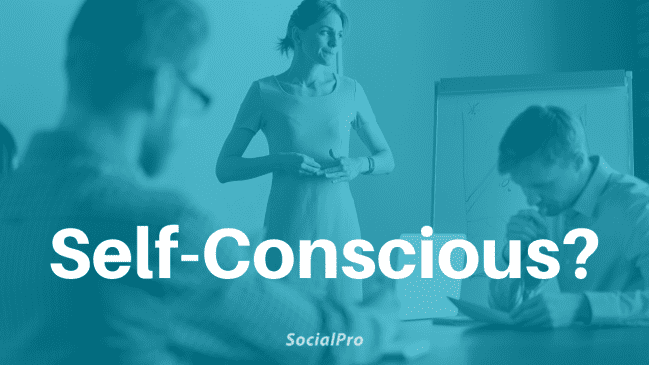





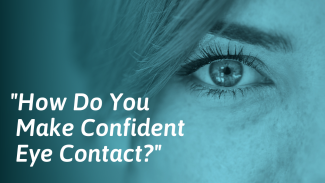
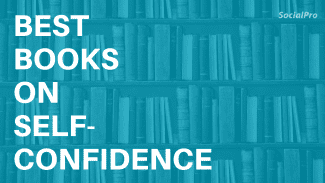
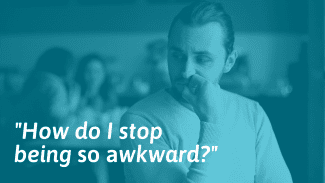
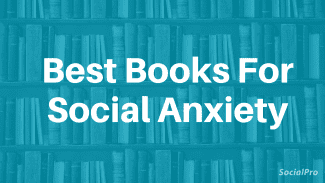
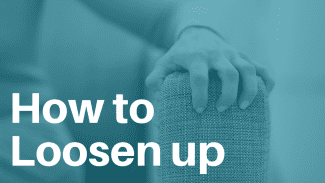
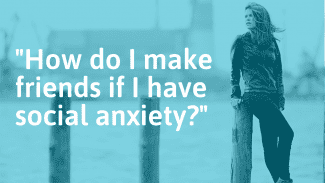
I worry about coming across being nervous in conversations. how it looks to the Person I’m having the conversation with, wether they see The nervousness, I often get really choked up and it feels like my brain isn’t working quick enough to make the conversation flow.
This happens especially when I get asked a question.
I’m afraid of a possible conflict that might happen if I confront someone for judging me. If I don’t confront them I might feel like I didn’t stand up for myself.
I’m afraid of being inadequate.
I’m afraid of being inadequate.
I worry about being quiet and boring, and also having nothing interesting today. I also worry I’m too serious and don’t laugh a lot without everyone and that I’m not very lighthearted.
Katie, I feel exactly the same way.
Yes I feel the same!
I am scared of being judge…. because i tend to think what the other person is thinking even if i am not even sure whats going on in there heads. But peoples faces make me think about all my flaws and then i consentrate more on my mistakes than on the conversation…
I am afraid of coming off boring. Sometimes I can have a conversation but I just cant seem to relax and be myself, everything I say is very quick and to the point with no continuation of conversation. This is also with my family.
I am always nervous of how I look. I never know what to say or if it will be interesting or not. I feel like when I do talk I can not stay on that topic.
I used to be overly anxious about how I looked, nowadays it’s more to do with the fact I am disabled and I need to walk with sticks or crutches. It’s not paranoia though as people Do judge you when you are disabled so I tend to let others talk first in new situations. It reveals a lot about How they see you.
I mostly worry about my exterior look: I keep asking myself wether the person I’m speaking to think I’m old, or ugly, or maybe that my voice is annoying. This sometimes really blocks my conversational skills, especially with girls I like.
I have the same problem! I start to get that funny feeling in my stomach when ever I start to talk. I get really bad anxiety when I talk to new people. I tried to do counseling but it didn’t help at all!
A lot of fears are in my head:
-aspect: old, fat, pale, bent back (despite the daily gym)
-judging I have a wasted life
-talking too slow, too low voice, unclear, words unusual for a common conversation
-with no interesting subjects, or too scholastic
-fear to look into someone eyes when talking
-fear to hurt with a bad word, or subject
Much of what you said perfectly mirrors my one experience.
I’m afraid of being the one left out; of having nothing in common with the people around me to talk about, about not being “cool” enough, and then I’m not even enjoying myself anymore and just want to go home.
i feel the same way
I’m afraid of how people will judge me if I make a mistake with my words or if I say something that sounds stupid. I don’t have any common interests with people around me so I don’t feel like I can fit in anywhere.
Me too!
I feel like that too!
I feel like that too, you arent alone.
I’m afraid of being seen as boring to people. Yeah I’m introverted, but I also like to have fun, and I can be social, but it’s just hard most of the time. I’m good at holding a conversation but not starting one if that makes sense. I also feel insecure when I talk to people who are seemingly more confident than me, I get self conscious about my appearance and my tone of voice when I’m speaking, I also get excessively sweaty and sometimes I talk too fast and stumble over my words. I just feel so awkward at times.
I feel the same as you i totally understand its a shame so many people on here like each other would be good to make a group where we could meet and chat
Dude, same here, specially the being sweaty part, I get sweaty even when going to the store or just going out to walk, it’s so annoying
I’m afraid of not sounding intelligent and interesting when I talk to strangers, acquaintances and relatives. I’m afraid of not sounding fluent or pronouncing words correctly. I’m afraid of having long pauses in a conversation, at that moment I go blank and there’s this awkward silence. I’m afraid of people noticing my every minute muscle movement. I’m afraid that people will notice my eye movements when I’m feeling anxious. I’m afraid that people will notice my anxiety.
That’s exactly how I feel especially with people that are educated.
I can totally relate. I expend so much energy trying to hide my anxiety that it leaves me exhausted
I’m afraid that people will judge me when having a conversation and then my brain goes blank and I don’t know what to say next. I feel like a fool when I can’t think of anything or I am not funny enough. I also worry what they think of my physical appearance and if I’m being too serious or look sad
This is exactly how I feel too!
It’s exactly same with me too!
I worry a lot when I decide to join a conversation that what I say or how I think may come off too harsh to other people. Ether that or I feel like I get ignored when I finally start to talk, so I just don’t.
When I talk, I always go into to much detail, I’m afraid to forget what I’m talking about. so a little story gets to be a big story and to much detail. And people have om several accations interrupted me and started talking about their own stuff. I have a low working memory so Sometimes forget what I want to say. And If i forget something and i realise it i start to babble.
So I hate to speak to new people, because I’m afraid they will cut me of and think I’m dumb.
I am not afraid of anything except for losing special ones. I often try to resist people for not getting closer, coz they’ll leave me after sometime.And then I left alone like i am now.
Everybody has his story to tell and more interesting then mine so I request you’ll please keep sharing them. It’ll definitely lower some burden.
I used to be very confident when I was younger, then I moved schools. I was nervous but I made lots of friends and was quite popular. I was too trusting and I met someone who was not as nice as everyone else. I started to realize that not all people are nice because after that person I started to tune in more on what others were saying around me and realized all the mean things being said about my voice, my height, my clothes, my actions. I started being self aware of everything and I slowly stepped into a shell and I’ve never gotten out of my shell again. I’m not close to family, friends, strangers,they all know the facade I put on. I try to much too get positive responses and attention even when I’m close to a breakdown and want to be alone, I try still so they don’t think bad of me. Even right now I’m scared righting this comment,,I’m scared I wrote too much. It’s my first comment on anything in years. Sorry if my comment is too long. I just want to say that that you are not alone, we’ll get through it!! Okay, bye.
Sry, I realized I didn’t answer the question. Long story short I am afraid of what others think of me and I want to please everyone even at their benefit and at my demise, if I’m not comfortable doing something I would still be loud if I have to and extra goofy for a person I will be, so I can get a positive reaction
I’m afraid that people won’t find me interesting enough or think I’m boring or that I’m weird. That’s why I always hide my true personality from everyone I meet.
Thats how i feel but i know im not boring but my ex wife destroyed my confidence but once im with people i know im not boring and can talk and hold a conversation with anyone and yea i feel odd coverd in tatts and earings in both ears and im male i tried to please others until noticed people took me for me !
I’m afraid of what people think of my voice when I listen to myself talk it’s sounds really annoying and I feel like people find it annoying too but I need to talk to be able to make friends at the same time 🙁
i’m scared of being judged on the way i look and sound, i feel like my lips look weird or people are judging the way i dress, i don’t wear the clothes i want to wear because i’m too scared of going out in public, i think my voice sounds like a child’s and that my skin is too oily in the summer. i also fear talking to people because i’m scared they are going to judge the way i say things and i’m scared i’m going to make a mistake or sound weird…
I feel the same way!
I get really nervous when I talk to people, even if they are family. When I walk into school, I feel like people are judging me in their thoughts, or talking about me behind my back. I dont know why. I am not a very confident person. I used to be, but after I moved to a new school, I lost my confidence. I cant talk to new people, unless I force myself to. I hate working with other people because I feel like Im not good enough. I dont know why. How can I help myself?
Like this exactly how I feel, and I can’t also really explain how and why I lost my confidence. In my old school I had always been the person who talks a lot in class and I never cared of what people said. But now at my new school, I don’t even know what to say to people, I’m now shy and on my own. I’ve totally lost my confidence and I can’t tell how it happened
I also feel same. Like in my old school I was always bold and was known to be an extrovert. I was never shy, and never cared about what people said or thought about me. But moving to a new school it all changed, now I am always shy in class, I don’t always know what to tell people. I’m always scared of being judged, so most times I just be in my own and do nothing, if if I am good at doing that particular thing.
I am really scared of talking to people .Be it anyone ,even my cousins .If I try to talk and pretend to be normal then also people say you are so silent and that again makes me feel I am dumb and my confidence goes down. I have many things to say in a conversation but because of anxiety I forgot to say it and the person standing in front of me also gets bored and it becomes awkward thatswhy I enjoy my own company being with no one .
People call me weird. I am not weird. I am unique, rare, and I love myself. Yet why do people still call me weird? Just because I actually have some sort of independence? because I actually have a personality? because I have quirks?
Because of this fear I noticed I am not as “me” in social situations. I don’t want to be weird I just want to feel normal. So I have noticed I have had to tone down my loud funny outgoing personality just to appear normal. Normal = friends. Why does society have to be this way?
I will no longer let fear of what other people think of me affect how I talk to people or make friends.
In the past I was rejected by a lot of girls/women and also, I was disappointed by a lot of my friends. Lately, I tend to be alone most of the time, I travel alone, don’t call anybody, don’t feel confortable to start a conversation with strangers and in general I don’t search the company of anybody else excepting my family. I don’t have any problem initiating discussions with coworkers and other people that I don’t really care about, but it’s a major issue when it comes to persons that I like or find interesting. I’m constantly afraid that I’ll have nothing interesting or funny to say, the other person will be bored or they have more important things to do and will say something like “Sorry, I’m really in a hurry/not interested! Bye!”.
Whenever I talk to people, even to someone I know well, I am not able to express myself fully because I am afraid they would judge me. I’m afraid I’d say something stupid or something that doesn’t make sense. I’m afraid that people would view me in a negative light.
me too
I always think that I am on a spotlight and everyone is judging me like in a social situation if i will not talk to someone they will find me rude and if i talk to someone they will find me nervous and anxious and will never talk to me